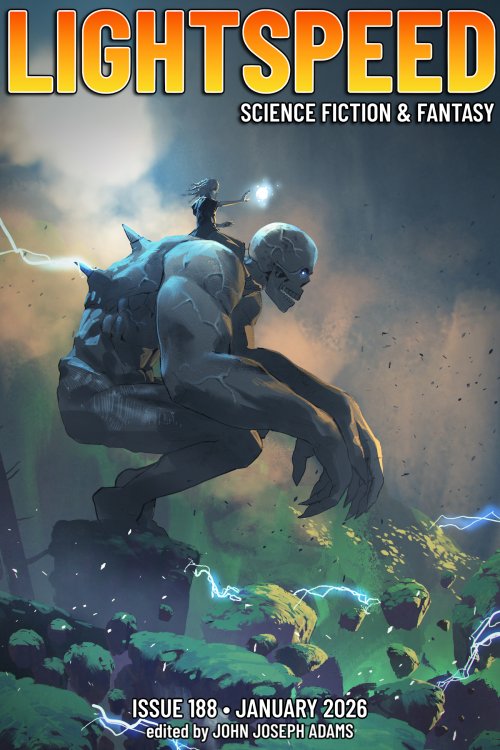How did “Operation: Grapevine” take shape for you?
I collect a lot of ideas for short stories as I wander around the city with my head in the clouds, so it’s hard to remember the genesis. But I do remember feeling very energized as soon as it popped into my head and wrote it mostly in one sitting. Strangely enough, another story I wrote that was published by this fine magazine, “The Aliens Said They Wanted to Party,” had a similar origin. (And then there are stories that take weeks to write that nobody likes, sigh). So there’s probably something to reflect on there, to not be precious about exploring every idea, but instead focus on chasing down the ones that really light you up.
AI is a big concern for a lot of creatives right now. Can you talk about your choice to make your “villainous” AI farcical and your overall approach to using humor to engage with serious topics?
One of the first SF books I read as a kid was I, Robot, which I consider sort of the gold standard of “Beware the AI” narratives, with its Laws of Robotics, and how they just keep going wrong. I thought it would be fun if, instead of focusing on how the AI evolved to be malicious, to just have it turn evil as a given. All it has to do is finish its annoying, petty primary purpose before it can blow up the world.
I try to keep an open mind about AI because it will probably help solve a lot of logistical problems we face. However, art has always felt to me a process for people to ponder what it means to be human. Funny that this labour has become such a burden that we would rather outsource it to machines.
The jokes, references, and banter in “Operation: Grapevine” really shine. What is your approach to testing, editing, and refining comedy in your work?
Thanks very much! I have a background as a stand-up and sketch comedian, which really helped me discover and hone my comedic voice in front of live audiences. I’m also fortunate to be a member of a weekly short story club that has read and discussed over 1,600 short stories (shout-outs to Peter, Jimmy, Mark, and Mel). You learn a lot about flow from reading that many. Also, the group is endlessly supportive in reading my stories and offering thoughtful feedback.
Grapevine’s directive is to find “100% hot goss” about everyone in the country, but for the characters we see impacted by this, their revealed secrets ultimately connect them and lead to deeper and more meaningful relationships. What do you think qualifies as “hot goss” and is it really something to get so embarrassed about?
Something that’s always felt very counterintuitive to me is the idea that to be cool you must also be aloof. I’ve always been unapologetically enthusiastic about the things I like, including bird-watching, which a lot of my comedian friends razz me about. But whenever we spot a bird they don’t recognize, you better believe they get excited and ask what it is. I love that in the Information Age, there is always someone out there that likes the same things you do, for better or worse. My goal was to make this story a celebration of the courage to put that vulnerability out there.
Where can our readers look for new work from you? Is there anything exciting you can share with us that’s coming up?
Thanks for asking! I’ve got some fun projects in the hopper, including a new sketch comedy album that will release late September, a couple of horror short film scripts that I plan to direct in the fall, and a handful of horror screenplays that I’m currently shopping around.
I invite anyone who is interested to check out my Instagram @buckstonne where I post about my work, including my profound excitement over “Operation: Grapevine” appearing in Lightspeed!
Enjoyed this article? Consider supporting us via one of the following methods:







